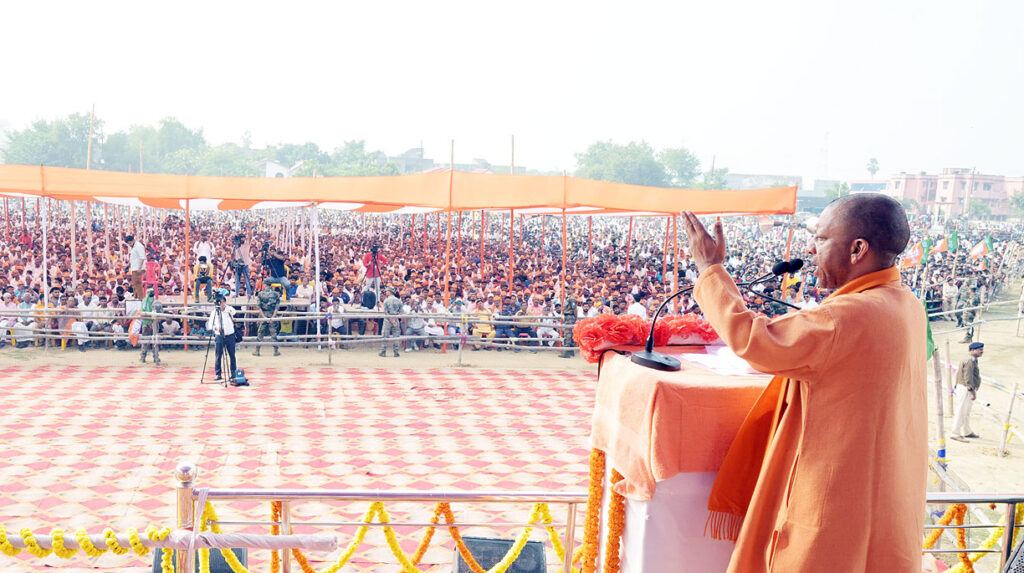As Jharkhand heads to the polls between November 13-20, 2024, the election campaign in the state has been inundated with hateful rhetoric from Bharatiya Janata Party (BJP) leaders, particularly regarding alleged Rohingya and Bangladeshi ‘infiltration.’ This reflects a clear surge in anti-minority hate speech targeting Muslims living in the state, who are indirectly referenced through these narratives.
The BJP, currently the opposition party in Jharkhand, has consistently promoted the claim that Rohingya Muslims and Bangladeshi migrants have infiltrated the state with the help of the ruling Jharkhand Mukti Morcha (JMM) and Indian National Congress (INC) coalition.
These references are a thinly veiled attempt at demonizing the state’s five million Muslim residents by casting doubt on their citizenship, falsely associating them with illegal activity, and fostering hostility against the community.
“JMM-Congress alliance has endangered the identity of Jharkhand, and there is a conspiracy to change its demography and identity; JMM and Congress are creating fake documents for illegal infiltrators and protecting all their wrongdoings; They are stealing your food, your daughters and your land; They will remove Adivasi reservation and give it to their ‘vote bank’” — said Prime Minister Narendra Modi at a campaign speech in Chaibasa, West Singhbhum, Jharkhand on November 4
These comments were echoed by other BJP leaders such as Home Minister Amit Shah and Defence Minister Rajnath Singh. In his November 9 speech at Potka, Jharkhand, Shah said,
“The Congress will give reservations to Muslims. Where will they get it from? They will take it out from the Dalits, SC/ST, OBC, and Adivasis, and give it to Muslims. They [infiltrators] come here, marry our women, and then usurp their land. They take our jobs and indulge in anti-national activities.”
Whereas in a November 5 rally, Defence Minister Singh told his audience,
“Continuously, these illegal infiltrators keep coming to Jharkhand. The adivasis were once a majority, but now their population has declined rapidly. Brothers and sisters, these infiltrators have grabbed your land! Just elect the BJP, and we will see who will grab your land then. We will stop illegal infiltration completely, and if they have grabbed your land, we will legally return it to you.”
The BJP’s use of this conspiracy theory of infiltration has become a central narrative of their election campaigning. All of the BJP’s star campaigners in the state have repeated some version of this narrative, including Agricultural Minister Shivraj Singh Chouhan, Uttar Pradesh Chief Minister Yogi Adityanath, Madhya Pradesh Chief Minister Mohan Yadav, Assam Chief Minister Himanta Biswa Sarma, and former Jharkhand Chief Minister Champai Soren. This form of pervasive anti-minority hate speech is critical for three reasons. First, baseless claims of fake documentation and land takeover can serve as a potential pre-emptive strategy to discredit the electoral process in the event that the BJP fails to reach a majority.
In his November 5 speech in Jamshedpur, Jharkhand, Yogi Adityanath claimed, “HC (High Court) has raised concerns on decreasing Adivasi population in Santhal province and their whereabouts, how has ‘another community’ become majority?”
These statements help create a climate of uncertainty that can be mobilized to create suspicion about the verdict and claims of voter fraud. This is especially pernicious given the anti-Muslim dog whistles that form the basis of the ‘infiltration’ and ‘takeover’ conspiracy theories.
Second, multiple speeches reference the long-standing Hindu nationalist conspiracy of ‘love jihad’ or the systematic conversion of Hindu women through marriage by Muslim men. By repeating claims such as “they trap our women in marriage to acquire land” by Shivraj Singh Chouhan or “these infiltrators already have two marriages back home and they come and deceive to marry Adivasi daughters to snatch land” by Himanta Biswas Sarma, the BJP is trying to create an environment of fear and insecurity among the voters. This is significant as the BJP is then able to cite its implementation of the controversial anti-conversion legislation in various BJP-ruled states, such as Uttar Pradesh and Assam, to position itself as the “savior” of women and tribals.
Lastly, another troubling aspect of this narrative is the relationship that the BJP is trying to frame between supposed ‘infiltration’ and the erosion of social services and reservations for the Adivasi community. This is dangerous as a majority of the state’s tribal community remains in poverty and relies on government social services and reservations in jobs. As a result, BJP claims such as “They (JMM-INC) have crossed the limit of appeasement. Where do you think all your jobs are going? They give them to the ‘infiltrators’” made by Home Minister Amit Shah in Hazaribagh, Jharkhand on November 9 signal a concerted effort at greater social polarization.
These claims are also aimed at preventing any form of social alliance between marginalized groups, such as the tribals and Muslims, that might benefit them socially and politically.
The clearest signal of this tactic was in Himanta Biswas Sarma’s speech in Chatra, Jharkhand on November 11, where he claimed, “ ‘this community’ (alluding to Muslims) do not divide even a single vote, but our vote is divided, this is the reason Jharkhand is slowly slipping from our grip.” The implication of the statement is that Muslims are expected to vote against the BJP, and in response, Hindus should consolidate their electoral support for the BJP to counter the perceived ‘infiltration’ threat.
It remains to be seen how this dangerous normalization of unsubstantiated claims about infiltration affects the electoral outcome in the state. However, irrespective of the outcome, it is clear that creating a fault line around religious polarization is in the BJP’s ideological and electoral interest. The Election Commission of India must enforce its code of conduct, which prohibits appealing to communal sentiments to mobilize votes. Strict enforcement is necessary to mitigate the adverse effects of hate speech on Jharkhand’s social fabric.
